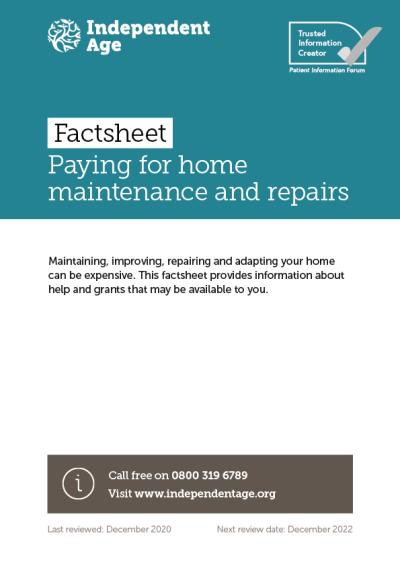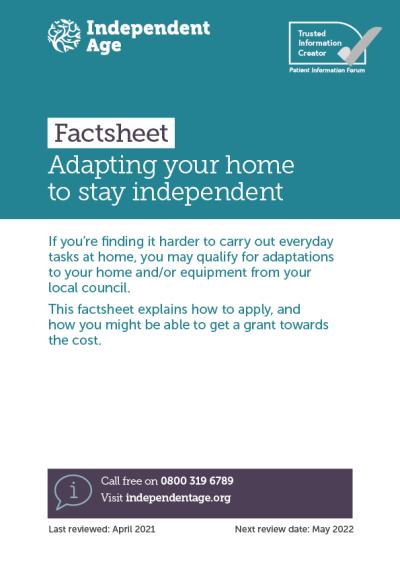Related publications

Choosing where to live

Paying for home maintenance and repairs

Your landlord has certain responsibilities for maintaining your home and carrying out repairs whether you’re a private, council or housing association tenant. Find out which repairs they are responsible for and seek help if they don’t carry them out.
Your landlord is responsible for most of the repairs in your home. This includes repairs to your roof, windows, walls, drains, guttering, stairs, heating systems (as long as you didn’t install them), external doors, water pipes, electrical wiring, and sanitation fittings such as the toilet, bath or sinks.
Your landlord must carry out any structural repairs to the property unless you caused the damage. If repair work carried out by your landlord has damaged decorations in the house, such as wallpaper, they must also correct this damage.
As a tenant, it’s your responsibility to keep your home clean and carry out small maintenance jobs, such as changing light bulbs or fuses and renewing bath sealant. You’ll probably have to pay to fix any damage you’ve caused and this may be taken from your deposit. This shouldn’t include normal wear and tear. You are also responsible for any appliances or furniture that you own. Shelter has more information about what deductions landlords can make:
You should have a written tenancy agreement that sets out the details of who is responsible for which repairs. However, there are some things that your landlord must do by law, whatever the tenancy agreement says.
You should have your boiler and other gas appliances serviced every year by a Gas Safe registered engineer. If you’re a tenant, ask your landlord to arrange this because it’s their responsibility.
Your landlord must ensure that gas safety checks are carried out each year on all gas appliances and flues installed in the property. They must keep a record of the safety checks for at least two years and give a copy to existing tenants within a month of the check, and to new tenants before they move in.
Your landlord must keep any space heaters they’ve provided, such as small electric or fan heaters, in repair and good working order.
If you’re a private tenant, your landlord must fit a carbon monoxide alarm in any room that contains a solid fuel burning appliance. They must also install a smoke alarm on each floor and may have to provide specialist alarms if you request them – for example, vibrating or flashing alarms if you have hearing loss. Test your alarms regularly and, if they’re not working, arrange for your landlord to replace the batteries or the alarms.
Your landlord has a legal duty to keep all electrical equipment safe and in proper working order throughout your tenancy. This includes light fixtures and plugs, as well as internal wiring and any electrical appliances they’ve provided.
If you’ve complained to your landlord about a possible safety risk in electrical equipment but that hasn’t resolved the problem, contact the trading standards department at your local council. You can find your council’s contact details on Gov.uk.
For advice about electrics, visit Electrical Safety First.
Your landlord is responsible for keeping the structure and exterior of the building in repair. This includes drains, gutters, external pipes and chimneys. You should keep chimneys and ventilation clear of blockages. You can find a chimney sweep through HETAS.
Tell your landlord if you have a damp problem. It’s important to identify the source because damp can cause health problems. They should arrange to carry out an inspection and do any necessary repairs, as well as fixing any damage.
Condensation is the most common cause of damp in rented properties and may be caused by poor ventilation. There may be things you can do to prevent it, such as:
Shelter has advice on how to get rid of damp and mould.
If your landlord doesn’t fix the problem, you can contact environmental health or the housing standards department at your local council. They can assess your home and any risk to your health, and mediate with your landlord.
You should report any repairs or damage to your landlord as soon as possible. This may be a condition of your tenancy. If the property is managed by a letting agency, you can report the problem to them. Follow up any phone calls in writing and keep a record of any contact you have with the agency or your landlord.
If your landlord is refusing to carry out repairs in your home, call our Helpline on 0800 319 6789 to arrange to speak to an adviser.
If you’re concerned that your landlord might try to evict you if you ask for repairs or complain about the state of your property, contact Shelter for advice and support.
Councils and housing associations should have a system for reporting repairs and you should receive information about this at the start of your tenancy. You should report any problems as soon as possible. You can find more information about how to report repairs and reasonable waiting times on the Shelter website.
If you’re a council tenant, the council must fix small urgent problems in your home quickly if they could affect your health, safety or security. You may be entitled to compensation if they don’t. Contact your council’s housing department to report a problem. You can find their details at Gov.uk.
If you have a disability, you may be eligible for a Disabled Facilities Grant (DFG) from your council to pay for adaptations so you can live safely at home. Your landlord will need to give their permission for the work. Our factsheet Adapting your home to stay independent has more information about DFGs.

If you’re having problems with your landlord over housing repairs, contact Shelter for advice and help.
By calling Independent Age's free and impartial Helpline, you can get information and advice from one of our friendly advisers, or order our free guides.